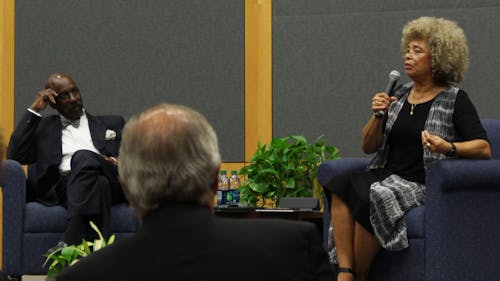At Rutgers, Former Black Panther and political activist speaks about U.S. race relations

As a former member of the Black Panthers and supporter of the Communist Party, political activist Angela Davis spoke at "Justice in Action" along with former Rutgers professor Lennox Hinds about the current state of activism in the United States.
Professor Edward Ramsamy of the Africana Studies Department introduced the two and said, "Both Lennox Hinds and Angela Davis belong to the tradition of not belonging to the status quo but for fighting for justice."
"Justice in Action" focused on exploring the intersections of social justice, law and activism and was hosted by the Paul Robeson Cultural Center, the Program in Criminal Justice and the Africana Studies Department.
Davis became a prominent figure in the 1970s when she was accused of being involved in an attempted escape from a trial in which several people were killed.
She has been a controversial figure as a member of the Black Panthers and supporter of the Communist Party, but is well-respected by many as a leader in the civil rights movement.
Lennox Hinds is renowned not only for representing Davis in the 1970s, but for representing former President of South Africa Nelson Mandela in both the United States and South Africa.
The two discussed current and past race relations and the Black Lives Matters movement throughout the event.
"In 1980 I presented a report on police crimes in the United States ... to the United Nations," Hinds said. "That report could have been written last week."
Hinds said it is clear that black people, Puerto Ricans, Mexicans, Native Americans and other minorities are the victims of deliberate government policies and practices that deny basic human rights.
Davis told the story of her most memorable visit to Rutgers in the late 1970s.
Davis, Hinds and others were attending a fundraiser on campus to raise money for Assata Shakur— a former Black Panther who was convicted of murder after a shootout with a New Jersey state trooper. The group was approached by police officers.
"We left, got in cars outside of the venue and suddenly the New Brunswick police comes after us and made me get out of the car," Davis said. "Lennox, who's in another automobile, sees what's happening and runs over because he's an attorney, of course, and gets ready to show his bar card and then the officer points a shotgun at his head. This was right here at the University."
It was a frightening moment for the group because they then understood what could happen to Assata Shakur if she were to come to New Jersey, she said.
"The police must be accountable to the communities they serve," Hinds said. "But herein lies the contradiction — what is the role of the police in our system? We're told that their mission is to protect and serve. Protect and serve whom?"
While Hinds spoke more frequently about police brutality and his history with Mandela, Davis shared her particular concern with the prison system of the United States and comparing the Black Panthers to the Black Lives Matter movement.
"It is so interesting that we have become captive to these ideologies about how we think about something like the death penalty, and we automatically assume that the alternative is life without the possibility of parole," Davis said.
Davis said it does not make sense to replace the death sentence with life without parole because the latter is equally damaging. She stands firmly against either alternative.
As a former member of the Black Panthers, Davis discussed what she saw as the pros and cons of the movement.
"I thought about the connections between these movements and I think that the connections can be connected not through similarities, but the radical differences between these two movements."
The two movements have similarities, but are vastly different because of technological advances with the Internet and social media, she said. The Black Lives Matter movement recognized early on that we should demand to demilitarize the police, unlike the Black Panthers.
"The Black Panther party emerged as a response to the police occupation of Oakland, California, and black and urban communities across the country, it was an absolute brilliant move ... to patrol the neighborhoods with guns and law books," she said. "In other words, they set out to police the police."
At the same time, Davis saw flaws in their strategy.
"It also reflected a failure to recognize, as Audrey Lorde put it, that the master's tools will never dismantle the master's house," she said.
When comparing the two movements, Davis said she prefers the analytical approach of the Black Lives Matter movement.
Society must place an emphasis on education, healthcare, housing and jobs, she said, and move away from a society that will always have to be policed, Davis said.
"We sometimes need to dream. We also need to remind ourselves of what we ultimately want," Davis said. "... We still have to remind ourselves that this is the direction in which we want to go."
Alexandra DeMatos is a School of Arts and Sciences junior double-majoring in journalism and media studies and women's and gender studies. She is the copy editor of The Daily Targum.



